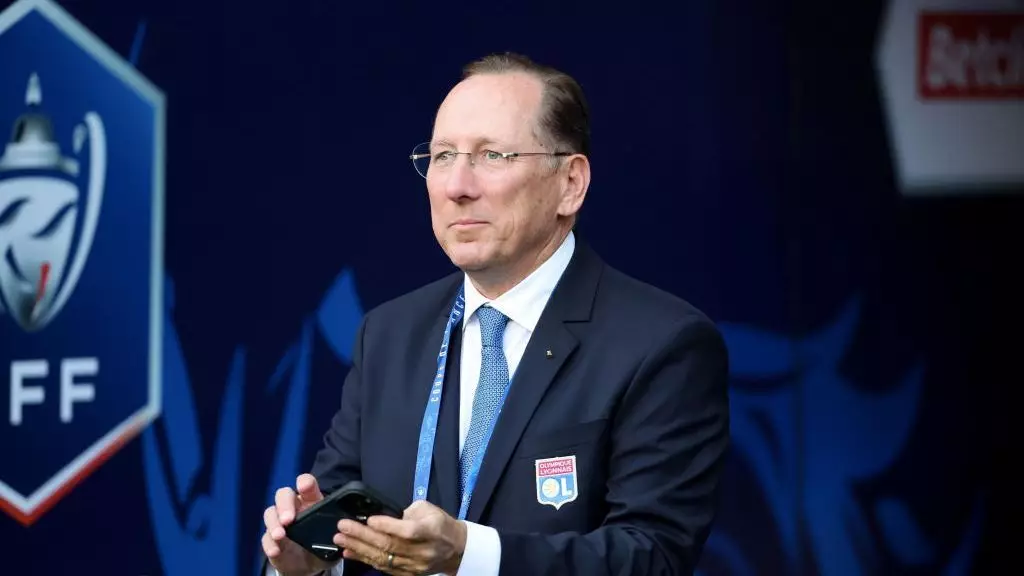The landscape of French football has always been vibrant, but the recent clash between Lyon’s American owner, John Textor, and Paris Saint-Germain’s (PSG) president, Nasser Al Khelaifi, has brought the issues of power dynamics and conflict of interest to the forefront. This rivalry not only highlights the intricate relationships within Ligue 1 but also raises critical questions about governance in football at large.
In a pointed radio interview on RMC, Textor did not hold back as he criticized Al Khelaifi and Vincent Labrune, the head of Ligue 1. His comments encapsulated concerns over Al Khelaifi’s overwhelming influence within European football structures, such as UEFA, and the perceived submissiveness of Labrune, whom he termed “PSG’s lapdog.” Textor’s portrayal of Labrune raises questions about the integrity and independence of the league’s leadership. The American entrepreneur, who possesses a minority stake in multiple clubs, argued that a healthy competitive environment is jeopardized when one individual holds substantial sway over key decisions that affect the entire league.
The term “lapdog” is particularly evocative, implying a relinquishment of authority on Labrune’s part, which in turn casts doubt on the legitimacy of the decision-making processes concerning broadcast rights and other essential league matters. Textor’s experience of witnessing Al Khelaifi effectively commandeering a meeting meant for Ligue 1 presidents was an eye-opener for him, illustrating a power imbalance that should not exist in a league aiming for equal representation and fairness.
Textor’s criticism sheds light on the potential conflicts of interest that arise when an individual is entrenched in multiple roles within the football hierarchy. Al Khelaifi’s positioning as the leader of BeIn Sport—a significant player in the media rights arena—raises ethical concerns. How can a president of a football club navigate decisions regarding league-wide TV rights without the looming shadow of self-interest?
Textor’s astonishment regarding the significant influence Al Khelaifi wields within the club’s operational framework illustrates how the dynamics of ownership and governance have evolved in modern football, often skewed toward wealthy stakeholders at the expense of competitive integrity. The implications are severe, as they could impact not only financial fairness but also the competitive landscape of Ligue 1, potentially disencharking clubs that do not have similar financial backing.
In response to Textor’s allegations, PSG released a statement that read almost as a reprimand. It accused Textor of a lack of class, suggesting that his outburst was rooted in arrogance. This defensive position might reflect a broader protective strategy as Paris Saint-Germain, a club with immense financial muscle, seeks to maintain its dominant narrative amidst rising criticisms.
The reaction from PSG also points toward the emotional stakes involved in this feud. As Textor and Al Khelaifi continue their off-pitch battle, both clubs carry the burdens of their proud respective histories, alongside ambitions for future glory. PSG, built upon Qatari investment and a constellation of star players, is navigating this narrative of elitism versus tradition, a theme prevalent throughout football today.
The ongoing feud is, at its core, a reflection of challenges facing Ligue 1. As debates around governance and accountability intensify, the league must confront its aspirations of being a competitive environment for all its clubs. Transparency and equitable decision-making systems are vital if French football is to reclaim any semblance of traditional competition against a backdrop of ruthless commercialism.
At a time when Kylian Mbappé’s impending departure from PSG signifies a pivotal transition for the club, the surrounding power struggles might shape not just the trajectory of these two clubs but also the league as a whole. As fans and stakeholders alike watch with bated breath, it remains to be seen whether these conflicts will lead to a reckoning for Ligue 1, propelling it toward a new era of equality or further entrenching existing power dynamics that favor the elite.
The unfolding drama between Textor and Al Khelaifi encapsulates much more than rivalry; it shines a light on systemic issues within football governance. As with all rivalries, the outcomes of these power struggles will echo through the annals of French football for years to come.

